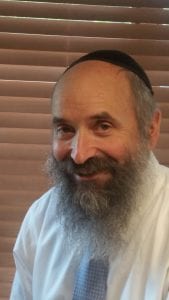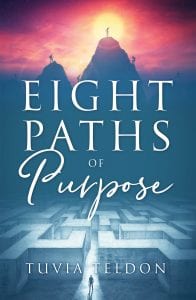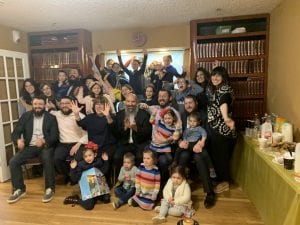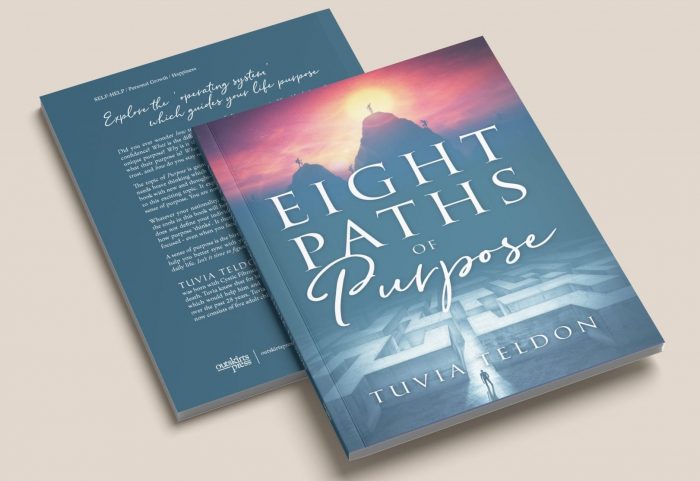Book Review: ‘Eight Paths of Purpose’
Reviewed by Jeffrey Sanzel
“We are internally wired to make the world a better place for ourselves and our children. Every time we take a step along this path, we feel an inner sense of accomplishment. Even if we have but a very small part in this process, we feel connected to the larger goal.”

Rabbi Tuvia Teldon explores the nature and power of purpose in his inspirational Eight Paths of Purpose [Outskirts Press].
His journey began in 1977 with the birth of his son, Boruch: “What happens when you thought you boarded the plane for Paris, but you land in Timbuktu?” Within five hours of the birth, the boy was diagnosed with a form of cystic fibrosis (CF) and required immediate life-saving surgery. Instantly, he and his wife faced a reversal of expectation. Dark questions crowded his mind — “How could this happen to us?” and “What did we do to deserve this?” They were presented with a difficult challenge to the family’s projected road.
Teldon worked to accept and embrace this seismic shift. Over the years, Teldon’s family grew, gaining four more children. Boruch’s health was relatively stable until he was nine, where things became worse. In June 1991, at age twelve, Boruch received a double lung transplant, giving the family greater hope. Sadly, the boy’s body rejected the transplant, and he died.
The devastation was unfathomable. “My burning question was what purpose could this Higher Power possibly have for bringing such suffering into the world, and specifically to my family?” In his quest for understanding, he began writing this book during the seven-day mourning period. He proceeded to work on it over the ensuing twenty-eight years.
For a piece of work that was born in such deep pain, it is an uplifting treatise on finding our way into the light of purpose. At the outset, Teldon delves into this concept, defining and clarifying purpose before exploring it in detail throughout the next hundred pages.
 The book’s central concept is that human beings inherently desire to make a difference and that this driving force, whether active or passive, is at our core. It is about embracing this idea and mining the possibilities it presents. Teldon also readily acknowledges that people are unique and have different things to offer.
The book’s central concept is that human beings inherently desire to make a difference and that this driving force, whether active or passive, is at our core. It is about embracing this idea and mining the possibilities it presents. Teldon also readily acknowledges that people are unique and have different things to offer.
It is this notion — what we have to offer — that is paramount. Tikan olam — fixing the world — should become our primary focus. (In the Japanese culture, it is known as Ikigai.) How we do this is an individual journey. Teldon lays out ways to delve within ourselves. He recognizes that people face different challenges — financial, emotional, etc. — and that often through accepting adversity, life experiences can guide us. Reframing negatives as positives and “turning tragedy into something good, even if only in some small way” are possible in our personal odyssey. Also, it can be the small things that have as much value as the large. Only we restrict our choices:
It is not limited to accomplishing some great feat or reaching a lofty goal. Purpose in life should be felt on Main Street and in our kitchen, just as much as in a place of worship, in the halls of Washington, or during an inspiring personal experience […] At one moment, purpose may be expressed through our attendance at a PTA meeting; at another moment, how we handle a difficult situation or fix a broken appliance at home; at yet another it could be our decision to donate to an environmental cause in South America.
He reminds that goals are not the endgame but that they will help us to fulfill our larger purposes. “A life of purpose inspires us to see all imperfections as opportunities for us to go beyond our limits and, one hopes, create meaningful personal growth while making the world a better place.”
Teldon breaks down his eight paths and also introduces a vocabulary to flesh them out. He discusses elements of life, personality, relationships, ethics, and happiness. Fate, faith, and God are all strong components. It is a book to be read carefully and — appropriately — with purpose. These are big concepts and demand to be taken in, thought through, reviewed, reflected upon, and returned to.
(On a personal note, even after a single reading, I found an immediate application; I found myself sharing the thrust of the book in a discussion with colleagues on a current project. The clarity of his terms and vision are invaluable.)

Many of the chapters end with a series of pointed questions followed by exercises to implement the precepts. Cumulatively, this gives Eight Paths a strong mix of the practical and the philosophical, alternating between explanation and narrative examples. Interspersed throughout the book are anecdotal and statistical insertions that liven Teldon’s discussion. Many of these enhance his central concepts with views on the history and evolutionary progress of the world. He quotes an interesting range of people from Thomas Carlyle and Helen Keller to Maria Shriver and Marla Gibbs.
Tuvia Teldon’s Eight Paths of Purpose is small only its length; it is huge in its scope. It is formidable in its insight and inciting the bridging meaningful acts into a purposeful existence. It is a both a primer and an advanced text on living a life of greater value and satisfaction. Ultimately, it can be summed-up in his choice of quotes from Ralph Waldo Emerson: “The purpose of life is … to be useful, to be honorable, to be compassionate, to have it make some difference that you have lived and lived well.”
A resident of Commack, author Rabbi Tuvia Teldon is the Senior Rabbi on Long Island and oversees a staff of over 50 rabbis in 38 centers. Eight Paths of Purpose is available at Book Revue in Huntington, www.outskirtspress.com, www.barnesandnoble.com and www.amazon.com.







